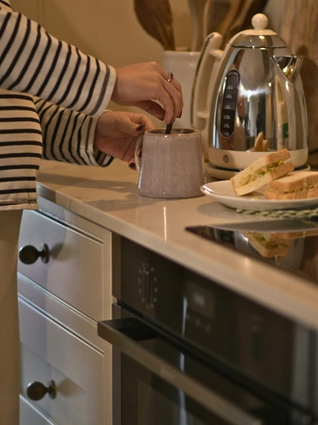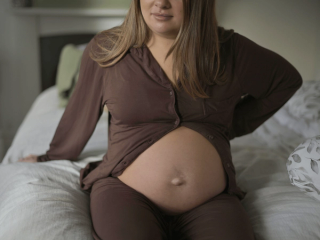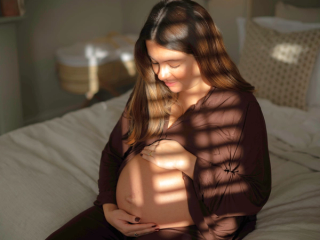
- Home
- Advice Hub
- Pregnancy
- Pregnancy Symptoms & Issues
- Food Cravings During Pregnancy
How To Navigate Food Cravings During Pregnancy
Can’t decide on how to navigate through food cravings during pregnancy? Learn expert tips on what to eat to get the right nutrients for you and your baby.
What are food cravings?
A food craving is the intense urge to eat a specific food. The desire to eat is not necessarily related to hunger and can be very hard to resist.
Pregnancy cravings and food aversions typically begin in the first trimester, peak in the second, and subside in the third, so if you are suddenly hankering for spicy chips and ice cream, you’re not alone. “I craved pickled gherkins,” says Helen at HiPP. “It was so bizarre. I would usually pick them out of my burgers, but suddenly that’s all I wanted. Well, that and Rich Tea Biscuits – which my husband kept eating before I got to them!”
This article will help answer all your craving-related questions such as ‘why cravings occur?’ and ‘when do food cravings begin in pregnancy?’
Why do you get food cravings?
While there is no clear scientific explanation for food cravings during pregnancy. However, they are linked to hormonal changes or the body's response for getting more essential nutrients for helping your baby grow.
Some researchers suggest that cravings may be linked to specific nutrient deficiencies, though the evidence is inconsistent. For example, a sudden desire for oranges might indicate a need for extra vitamin C, while a craving for milk could suggest a demand for calcium. However, not all cravings fit this pattern. There might be a strong urge for foods with no obvious nutritional reason. This makes it difficult to know exactly why cravings happen during pregnancy.
When do pregnancy cravings start?
Cravings can begin as early as the end of the first trimester. Most women who have food cravings will have them in their second trimester. Pregnancy cravings typically start towards the end of the first trimester and become stronger during the second trimester (week 13 to 27 of pregnancy).
Common cravings when pregnant
Craving sweet things during pregnancy is also common, and some women find themselves craving fruit during pregnancy. Often the types of food you crave are dense in carbohydrates (think potatoes, rice or bread) or protein (like meat or fish).
Commonly reported food cravings include biscuits, bananas, nuts, pickles and ice cream and ice lollies, chocolate, crisps and cheese.We asked our HiPP family what they/their partners wanted most during pregnancy and the answers included cookies, chocolate, liquorice, fruits and milkshakes. Interestingly, some of our mums reported preferences changing over time – like Laura, who says ‘I could only stomach beige foods at the beginning of my pregnancy. French fries were my go-to. But once I started feeling better, I craved soft, fleshy fruits. Nectarines were my favourite, but I loved pineapple and strawberry, too.”
While pregnancy cravings might have you adding new foods to your diet, food aversions during pregnancy have the opposite effect. such as developing a dislike for foods that are strong tasting or strong smelling is common. Examples are coffee and some other bitter foods. It’s also common for pregnant women to develop an aversion to handling raw meats – a biological response, perhaps, to avoid the bacteria that can lurk there. Or, sometimes, particular smells can make you feel nauseous. So, if your other half is looking for a way to support you through your pregnancy, food prep can be a good one.
Are there weird or unusual pregnancy cravings?
Some women experience weird pregnancy cravings like unusual food combinations (pickles with ice-cream) or even foods that you don’t normally like. Unusual cravings in pregnancy are not harmful, but remember- if you crave non-food items, like coal, sand, or even laundry detergent then do not consume these items. This condition, known as pica, might indicate a nutritional deficiency, so it is important to see your GP.
What happens if you ignore pregnancy cravings?
If you are eating a balanced diet overall, ignoring pregnancy cravings will not do any harm to you or your baby. If you are craving sugar during pregnancy, as long as you are eating well, it’s fine to ignore these. However, if you are avoiding major food groups (such as protein or carbohydrates) due to strong aversions, you might be missing out on important nutrients. If this is the case, speak to your healthcare professional to ensure you're getting everything you need.
How to manage your pregnancy cravings
It can be difficult to avoid food cravings, and having all food groups in moderation is encouraged. Here, we lay out some guidance for helping you manage any cravings and ensuring you maintain good balance in your diet.
5-a-day, every day
Our nutritionist, Helen says ‘You don’t have to balance every meal, but you should try to achieve a balance over the day or week. Try to get at least five portions of fruit and vegetables into your diet each day , whether that’s fresh, frozen, tinned, dried or juiced. Consuming a wide variety ensures you receive a diverse portfolio of essential vitamins and minerals, along with fibre.’
Eating for one (and a bit)
If you’re not feeling too sick, you might find yourself hungrier during pregnancy than you were before. Though the idea of ‘eating for two’ has been widely debunked (shame!), it is ok to increase your calorie intake slightly in the final trimester, by about 200 calories a day. However, the most important thing is that you’re eating the right foods to keep you and your baby healthy.
Know your portion sizes
One portion is:
- 80g of fresh, tinned or frozen fruit and vegetables
- 30g of dried fruit
- 150ml fruit/vegetable juice or smoothie
And some portions only count once – such as juices, smoothies, beans and pulses.
Carbs are your friend
Starchy foods are a good source of energy, fibre and some vitamins, and should make up a third of the overall food eaten. These include potatoes, bread, pasta, noodles, rice, couscous, oats, and other cereals.
‘Wholegrain starchy foods are preferable to refined varieties, as they help increase your fibre intake,’ says Helen.
Protein
Protein is one food group that comes with a lot of recommendations during pregnancy, including foods to avoid. Meat should be thoroughly cooked, as should eggs unless they have the Lion logo on them (in which case they are safe for dipping!). The rules on fish sound complex, but aren’t too restrictive (unless you are a mega sushi fan):
- Try to eat at least one but no more than two portions of oily fish a week, such as salmon, sardines, or trout.
- No more than two tuna steaks or four medium-sized cans of tuna per week
- Avoid raw or partially cooked fish and shellfish
- Avoid shark, swordfish and marlin
You’re also advised to avoid liver, all types of pâté (even the vegetarian kind), as well as game meats such as pheasant.
Helen adds: ‘Processed meats like bacon, ham, and sausages can contain high amounts of salt, so these should also be limited. Of course, protein isn’t just found in meat. Pulses, beans and (unsalted) nuts are also good sources of protein.’
Dairy & Alternatives
If you’re a cheese lover, fear not. ‘Milk, cheese and yoghurt are all good sources of calcium and other nutrients that you and your growing baby need,’ says Helen. ‘However, you should avoid unpasteurised cow, goat and sheep milk products.’
And, if you crave Camembert, burn for Brie, or hanker for a honking blue cheese, you’re not totally out of luck. Pasteurised and unpasteurised, mould-ripened and blue cheeses do not have to be avoided completely, though they must be cooked until steaming hot to ensure there’s no lingering harmful bacteria in there.
Caffeine and alcohol during pregnancy
Thank goodness for decaf – because the NHS recommends caffeine intake during pregnancy does not exceed 200 mg per day. To put that into perspective, there are:
- 100 mg of caffeine in a mug of instant coffee
- 140 mg in a mug of filter coffee
- 75 mg in a mug of tea (including green tea)
- 40 mg in a can of cola
And if you’re partial to a drink at the end of the day, note that the NHS advises the safest approach is to not drink alcohol during pregnancy.
What about additional supplements?
Eating a healthy balanced diet will help ensure you achieve your nutritional requirements; however, you’re also recommended to take folic acid for at least the first 12 weeks of pregnancy, and vitamin D throughout. Additional guidance and advice can be found on the NHS website.
‘Pregnancy can be an anxious time, and it’s easy to get ‘in your head’ about the optimum pregnancy diet,’ says Helen. ‘At the end of the day, much of the advice is the same as for the rest of your life – eat a good balance of food types to give you and your little one all the nutrients you need to thrive.’
FAQs around pregnancy cravings
Pregnancy cravings usually resolve by the beginning of the third trimester. This means that most women experience cravings for a significant portion of their pregnancy, but they tend to reduce as the pregnancy progresses.
Yes, it is normal to experience no cravings during pregnancy. Each pregnancy is different and some people don’t experience many pregnancy symptoms at all, including food cravings.
No - food cravings are not bad. In fact, they are a very common and normal symptom of pregnancy and likely occur to support your baby’s development. It is important to see your healthcare professional if you are craving (wanting to eat) items that are not food.







